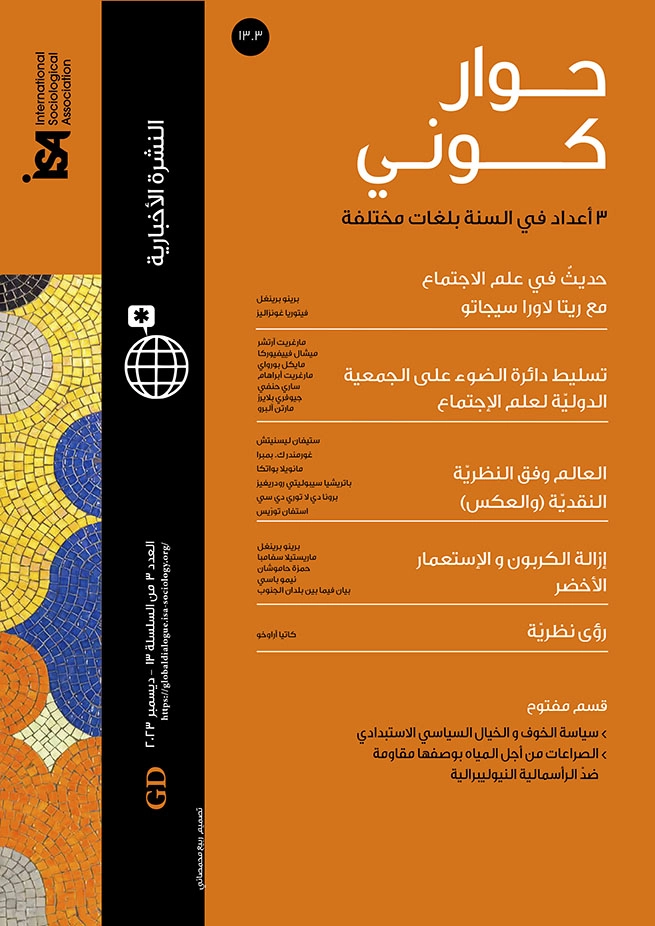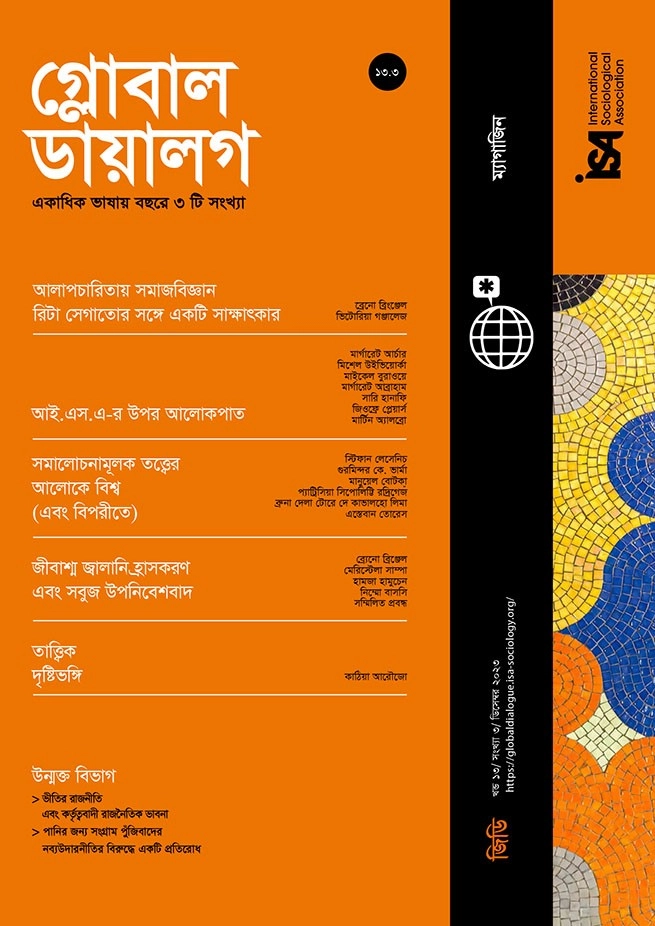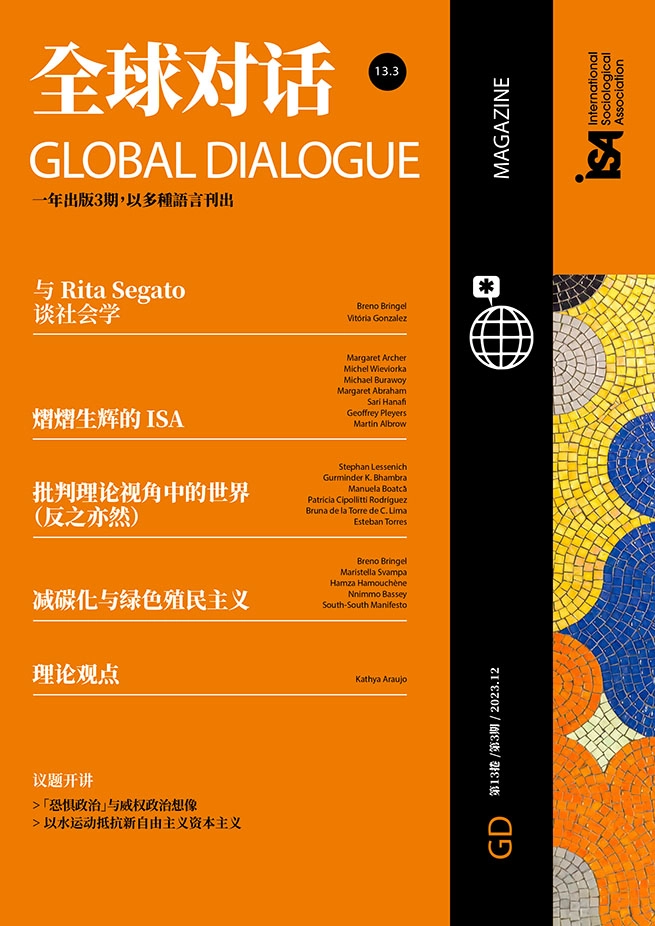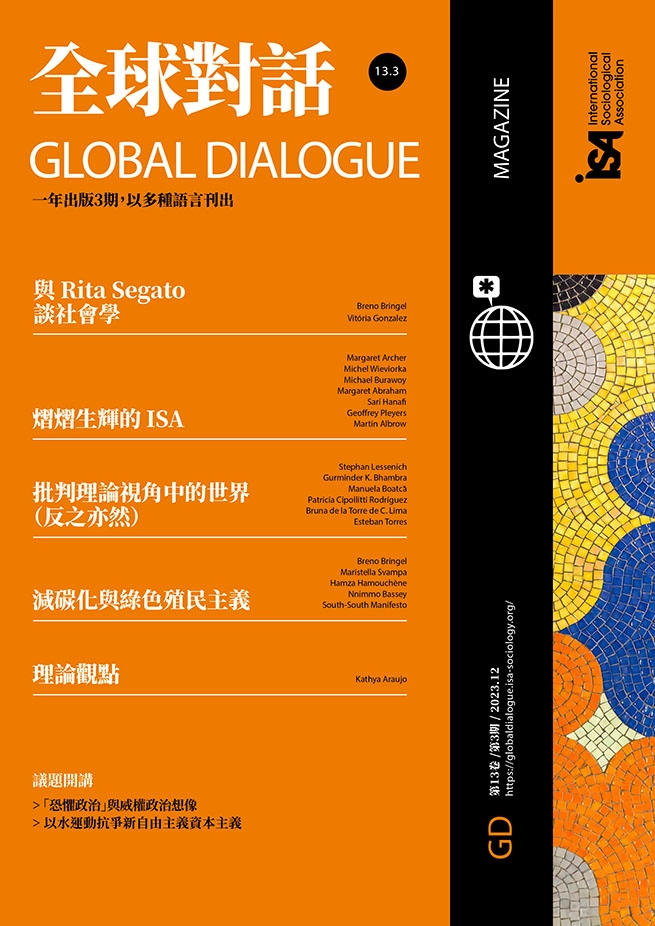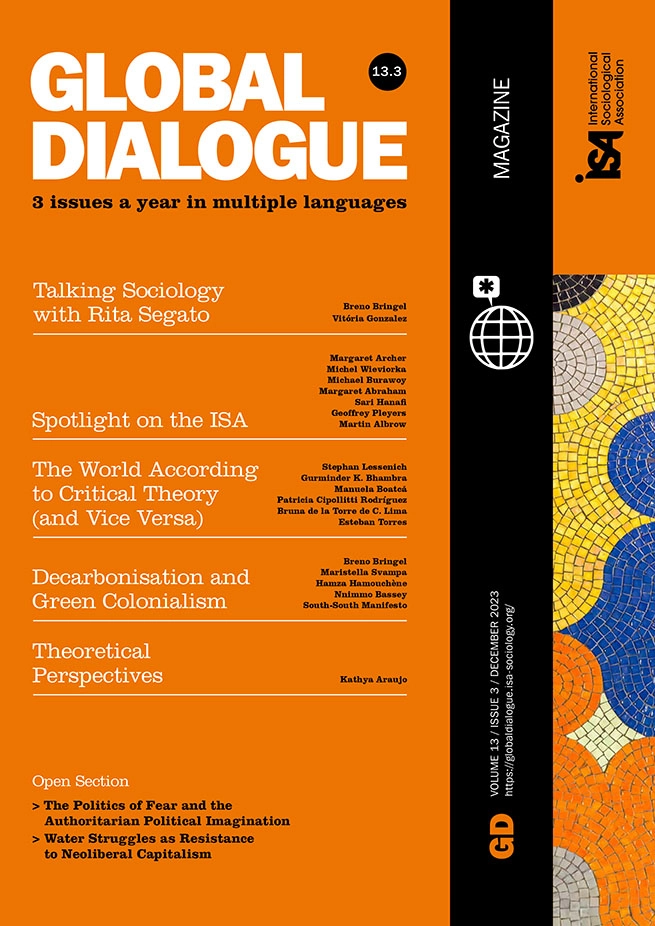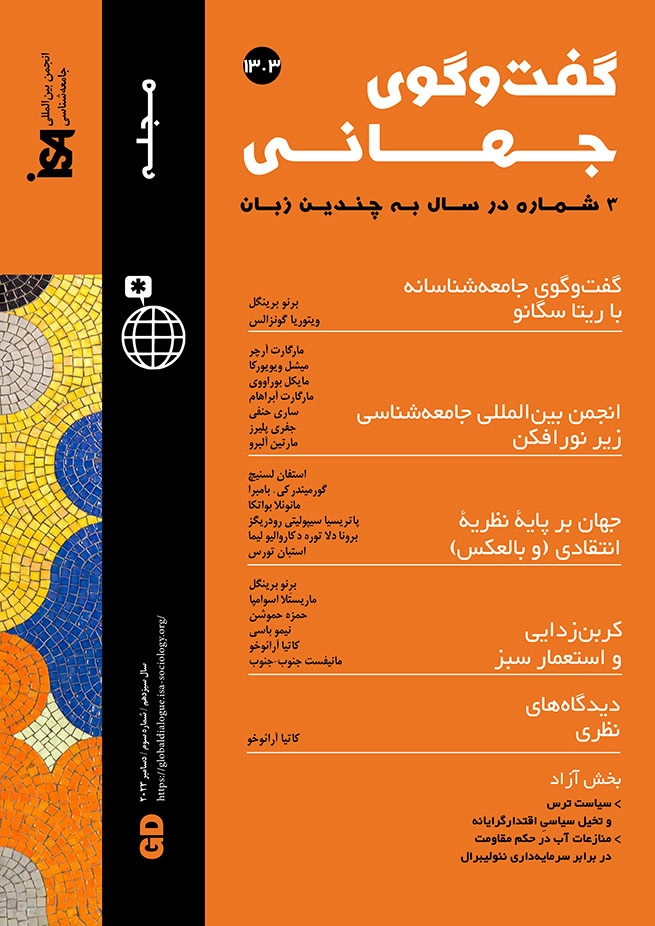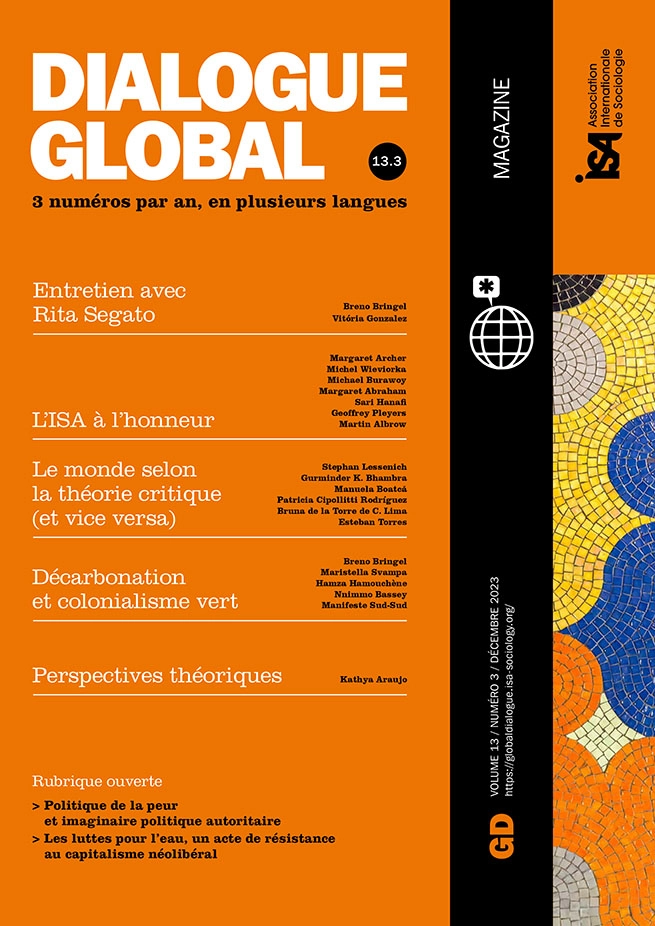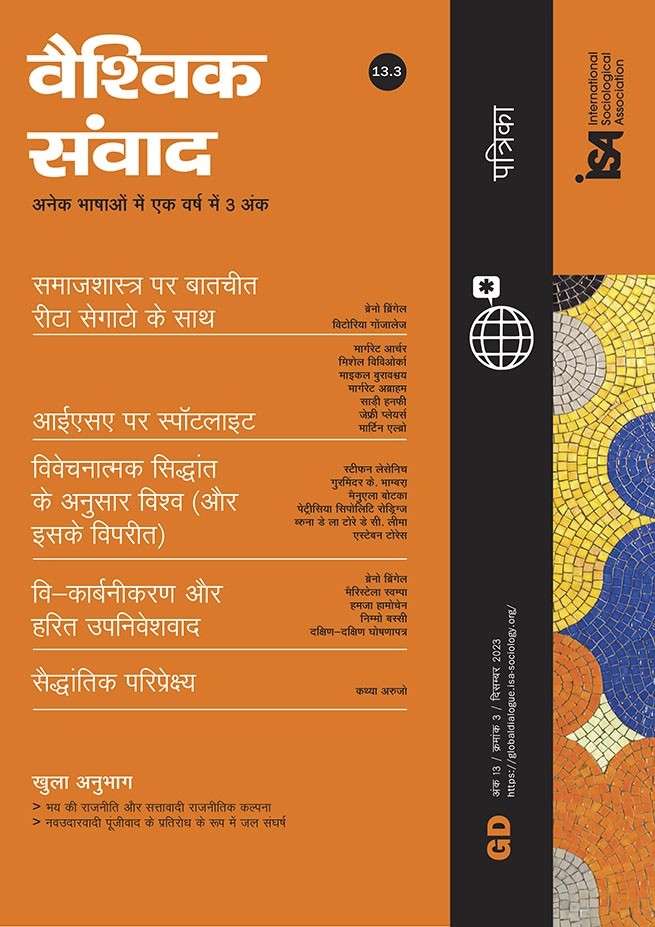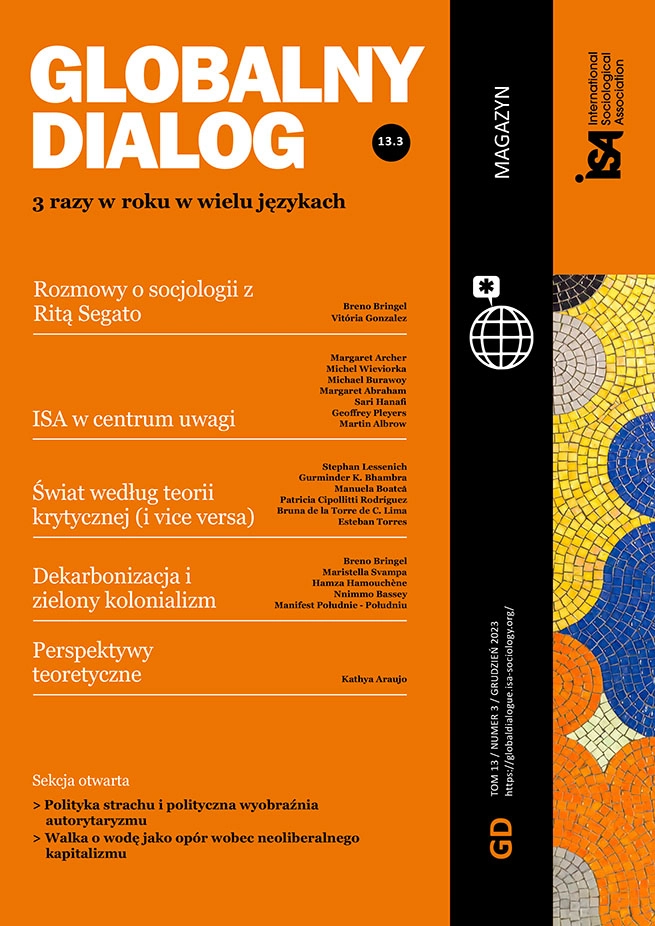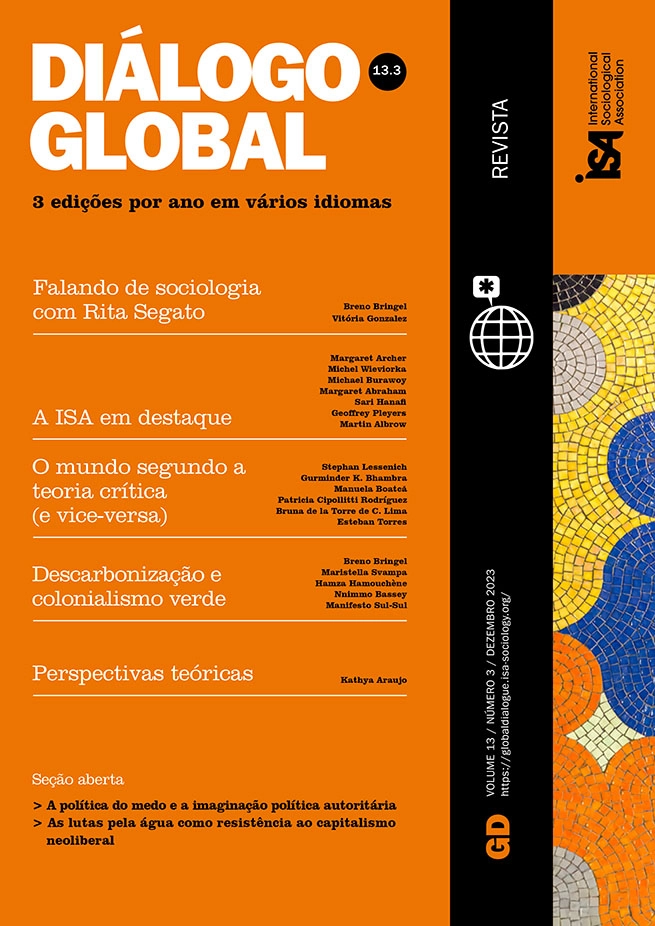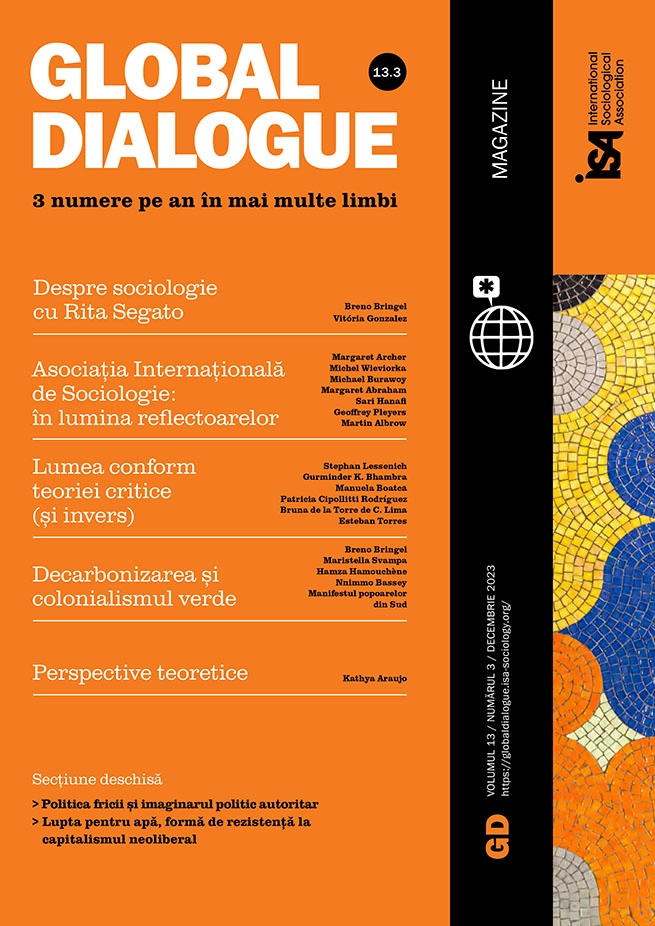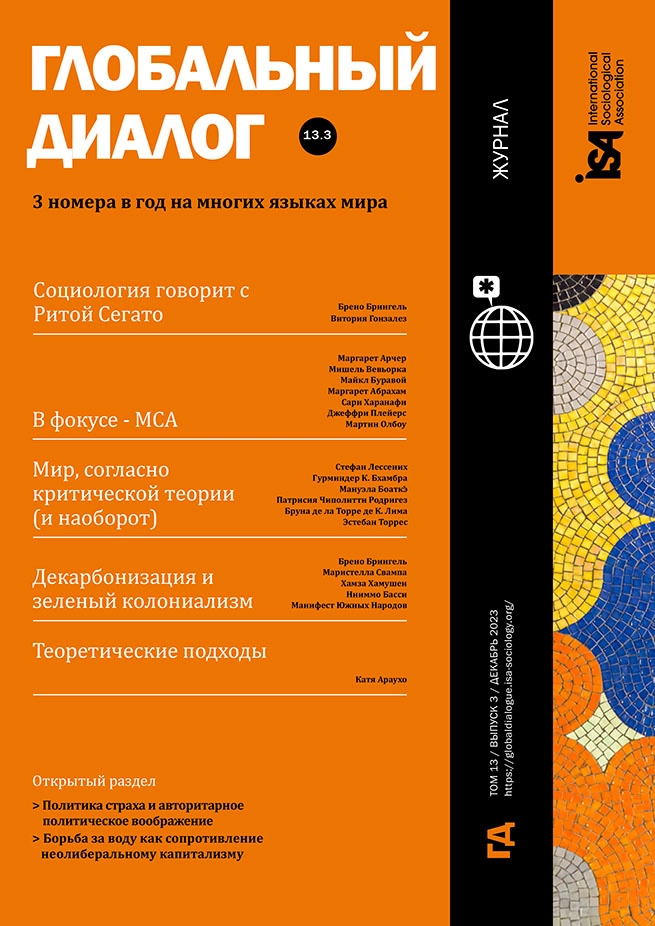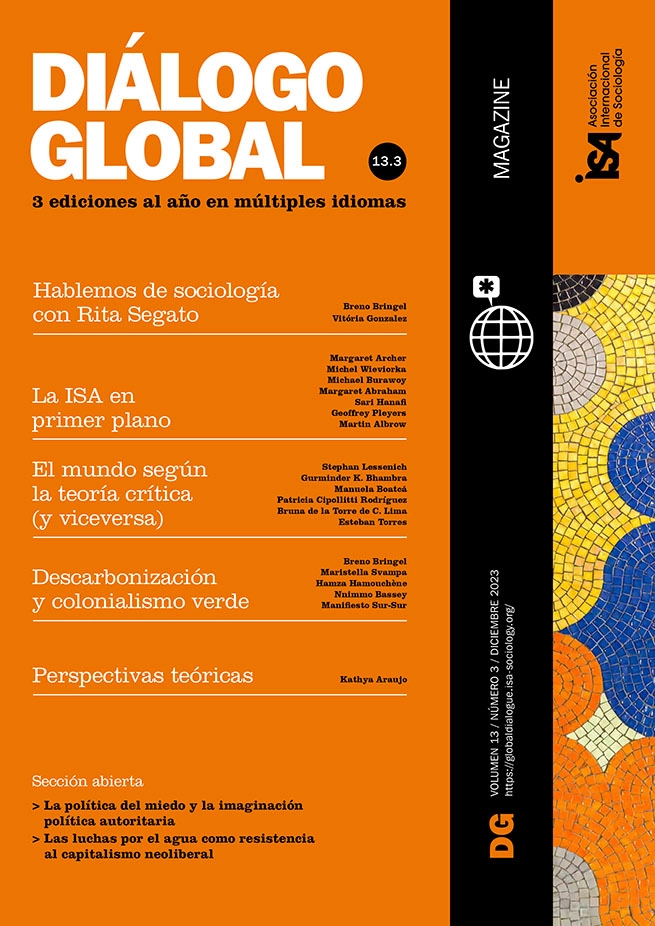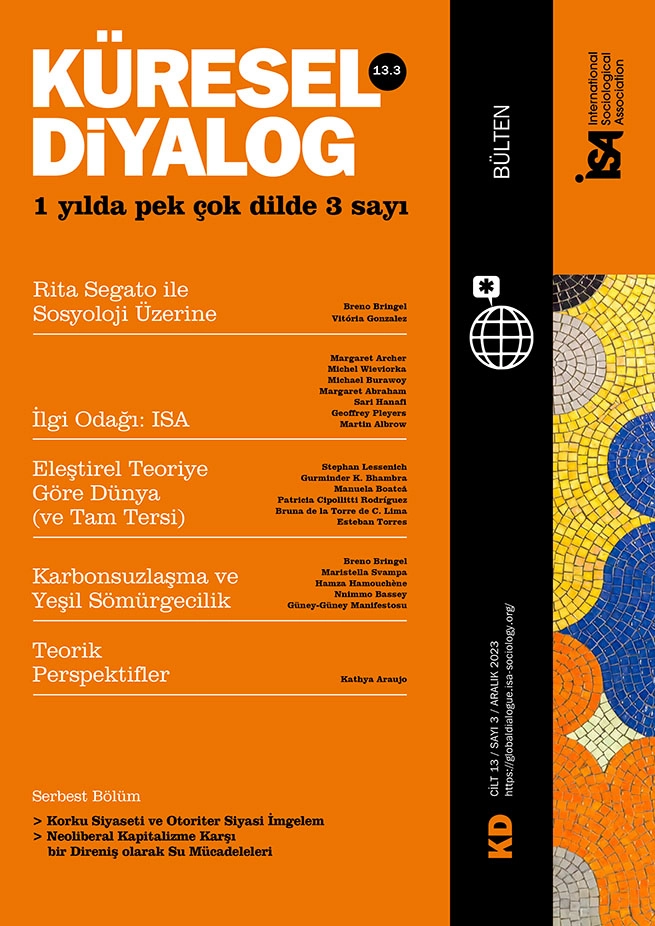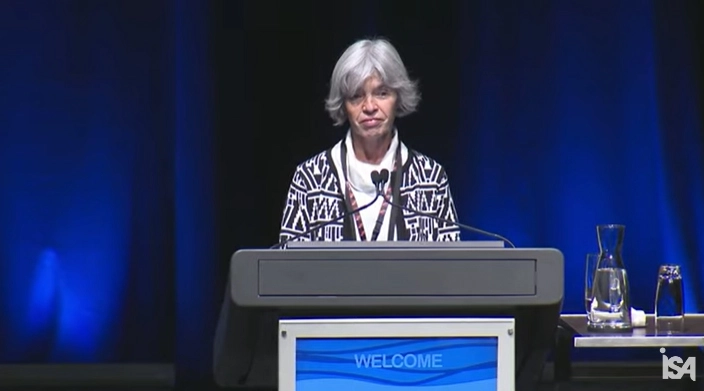Read more about Spotlight on the ISA
Global Sociology: Four Transformations
by Geoffrey Pleyers

Personal Tribute to Margaret Archer (1943-2023)
by Martin Albrow
November 14, 2023
Over 40 years ago, the Executive Committee of the International Sociological Association (ISA), meeting in Poland, also met Izabela for the first time, standing dignified amid drifting snowflakes to welcome us. As the niece of Magdalena Sokołowska, I assumed this doctoral student was only helping with local arrangements. How wrong can one be? This was not one week off her thesis on Virginia Woolf but an introduction to four decades of working for the ISA. We got on immediately; after all, my school had prepared me for a degree in English literature, but I did wonder for several years if we had done right in encouraging her to leave Poland for the nomadic ISA.
The one person with no qualms was Tom Bottomore, one-time Executive Secretary himself, before becoming ISA President, who very early recognized Izabela’s administrative and organizational talents whilst the Secretariat was based in Brussels. He became her lifelong supporter and friend as one of the rare men at the time who saw no contradiction between being female and professionally competent. Both of us were beneficiaries of his ‘enlightenment’! Brussels was not to last, and plans were underway for transferring the Secretariat to Spain (1987). This was a challenging move as the ISA’s understanding of the provision of a base for the Secretariat became entangled in a conflict with an indigenous but new Centre for Research, which counter-claimed the same accommodation in Madrid. I recall some ‘negotiations’ involving housing a genuinely enormous table and the ISA’s protestations to the Ministry of Education.
When I write about ‘the Secretariat’, in fact, in 1987, this meant Izabela alone, who was a beginner in Spanish, had a huge talent in networking but knew few colleagues in Madrid, and had her common sense alone to rely upon as far as the domestic housing market was concerned. Her resilience was remarkable. She rapidly gained the support of the Professional Association in solving the accommodation problem, showed her talent in consolidating a new working team, quickly became enviably fluent in Spanish and acquired the rooftop apartment that it’s hard to believe I’ve visited for the last time, to share a bottle as the sun set over Madrid.
Because the Executive Committee held its annual meeting in a different city every year, Izabela and I travelled together and became globalized before the term existed. Our collaboration intensified when I became President, and only then did I realize how extensive her responsibilities were. From starting a new journal (International Sociology) – introducing Spanish belatedly as a third official language – and coping with the proliferation of Research Committees, to the protocol for welcoming the King and Queen to the World Congress (1990) – all these tasks impinged upon her and were effortlessly incorporated into her administrative workload.
Izabela later returned to her early aim of completing a doctorate, but this time devoted to the Solidarity movement in Poland and later published in Spanish and Polish. We always kept in touch. Most years, we attempted to take a week’s holiday somewhere (often with Céline Saint-Pierre). Finally, when I became a Visiting Professor at the University of Navarra, Pamplona, it was delightful to fly in and out of Madrid and spend a couple of days with her – shopping for cushions, visiting the art museums and opening another bottle of wine on her roof garden. Izabela enriched every single member of today’s ISA, including those who never had the privilege of meeting her. May she find her return to Poland welcoming and fulfilling.
Margaret Archer (ISA President 1986-1990) *
* Margaret Archer wrote this on April 2, 2023, a month before she passed away (see the obituary in this issue of Global Dialogue).
ISA... IZABELA: yes, ISA has been “Bella” with IZAbela. Having been part of ISA since 1982 (Mexico!) and having worked closely with her when I was President, I can say that our association would not have been what it has been until now without her.
She has always been both incredibly efficient and wonderfully friendly. Aware of our intellectual and scientific life, part of it, and excellent in administrative matters. Really global and international, and so Polish – on the good side of Polish political and social life. Present when necessary or useful but without any excess. Knowing everything and so many people among us, but never interfering. Let me add one word in French: Izabela is more than a critical actor of ISA. She is an elegant person; she has “la classe”, la “grande classe”. I wish her all the best for her new life.
Michel Wieviorka (ISA President 2006-2010)
Izabela Barlinska has devoted herself to the flourishing of the ISA and, thereby, has become a major contributor to the development of international sociology and more recently to global sociology. It is very sad to hear of the passing of Margaret Archer, for she was another contributor to this project, working closely with Izabela in the crucial years when the ISA was being set up in Madrid. Of all the Presidents, she knew Izabela the best. Her tribute to Izabela was probably one of the last things she wrote.
Margaret Archer tells us how Izabela was recruited by her aunt to welcome the Executive Committee to Warsaw in 1977 when Izabela was still a student. This was four years before Izabela became deeply embroiled in the Solidarity Movement. When Martial Law was declared on that fateful day in December 1981, the underground leadership of Solidarity encouraged Izabela to take up an invited position in the office of the ISA. The leadership thought her presence in Western Europe could provide an important link between the opposition in Poland and those in exile. To be clear, Izabela was not fleeing her country; she was not seeking asylum in the West. That never occurred to her. She was a loyal citizen of Poland, doing what she could to support democratic forces in Poland – a study of Izabela’s life is especially fitting for the theme of this year’s Congress, devoted to anti-authoritarian politics.
Although she never liked to flaunt her knowledge and expertise, we should remember that Izabela is a sociologist. While directing the ISA, she wrote her PhD dissertation at Complutense University in Madrid under the supervision of Professor Víctor Pérez-Díaz. It is a study of everyday life under Polish Solidarity and Martial Law, situated in the changing character of the opposition to the party state. The dissertation was published in Spanish under the title La sociedad civil en Polonia y Solidaridad (“Civil Society in Poland and Solidarity”). Although she didn’t know it then, she shows how this was the beginning of the end of the Soviet order. It is an essential reminder that struggles against authoritarianism may not be successful in the short term. Still, nonetheless, they can have long-term effects.
But I stray from my topic – Izabela and her contribution to the ISA. I echo the sentiments of Michel Wieviorka and Margaret Abraham – she has been the pillar of the ISA. Let us not forget that when she began her association with the ISA in 1977, there were barely 1,000 members. When she became Executive Secretary in 1987, there were scarcely 2,000 members compared to the number before COVID exceeding 5,000 members. The numbers of Research Committees and National Association members have expanded at a similar exponential rate as the attendance of the Congresses. She oversaw the introduction of the bi-annual Forum. Throughout these 40 years, from her small office in Complutense University, Izabela has guided the ISA through tremendous technological transformation. Somehow, she has managed to keep the machine going – with the assistance of part-time workers Nacho, Juan and Lola. Let us not forget that, today, the American Sociological Association has only doubled the ISA’s membership but is served by 23 full-time staff! Let us be clear: the financial health of the ISA has depended upon the energy, devotion, and organizational genius of Izabela Barlinska.
As Executive Secretary, she has successfully negotiated this terrifyingly fractious organization – a mini United Nations – only because she has studiously kept out of ISA politics. She keeps her thoughts to herself in EC meetings, even under the most intense provocation. Her goal has always been supporting the ISA machinery, fostering important innovations like Wallerstein’s regional seminars, Martinelli’s PhD Laboratory, or Archer’s new journal, International Sociology.
The EC makes the decisions, and Izabela carries them out to the best of her ability. And she is not one to shirk any labor. I still remember her working around the clock to attend to the long lines to register at the ISA Congress in Durban. She has always been in the trenches and on the frontlines of ISA meetings, just as she kept the ISA going backstage between meetings. She was the one to deal with the many crises we have faced – whether it meant switching a conference from one site in the world to another, peremptory closure of our office, negotiating for space for the Congress or Forum, etc. She had to ensure the ISA didn’t lose money when overseeing the budget. Compared to other international organizations in the social sciences, ISA has had a long and thriving history – and we all owe Izabela an enormous debt. I wish her all the best as she moves on to her new career back in Poland.
Michael Burawoy (ISA President 2010-2014)
I have been truly fortunate to know Dr. Izabela Barlinska for over three decades. I am deeply grateful for having had the privilege to work closely with her. Izabela, your incredible calmness in crisis, multilingual capacity, institutional memory, and attention to all facets of ISA operations have been invaluable. Having worked closely with you, especially during my tenure as ISA Vice-President for Research and as ISA President, I can state that your tremendous support contributed to the success of the II ISA Forum in Buenos Aires and the XIX ISA World Congress in Toronto. I know what we all achieved could not have been done without you and your team’s commitment, competence, professionalism and collaboration. As a feminist, I am also grateful to have had such an amazing woman and most highly qualified professional sociologist at the ISA secretariat’s helm, contributing with vision and pragmatism to ensure the global sociological community’s common good and continuing ISA’s organizational vitality. ISA is a remarkable association, and I am glad you, Izabela, have been integral to this association’s fantastic journey. So, I salute and hug you with a huge, sincere thank you!
Margaret Abraham (ISA President 2014-2018)
After all these testimonies, I am speechless. Yet the difference with all these testimonies is that I got to know Izabela Barlinska much earlier in my career than all these former presidents. This was when I was a Ph.D. candidate and one of the winners of the World Competition for Young Sociologists in the Congress of Bielefeld in 1990. Her kindness impressed me as she replied patiently to many of my questions. Some of them were stupid, as it was the first time I attended a big conference.
Since then, I have been in close contact with her as a member of the Executive Committee, Vice-President of National Associations and, more recently, as ISA President. She has never been reluctant to provide wise advice to me when I requested it. I should confess I did not always follow it, but, to her credit, this has not vexed her. In any case, I don’t remember Izabela ever being excessively angry. Even in heated discussions, I envied her calmness. She may react after taking her time to reflect on heated matters.
I often enjoyed my conversations with her outside meetings. We rarely gossip against colleagues. Instead, we talk about Lebanon, Palestine, Poland, sociology, arts, literature, etc. As a cosmopolitan person, she has a great general culture. During COVID-19, we had many online meetings with VPs, EC and other committees. She often does not cast her availability in a doodle as she would always accommodate the best time for most of the meeting participants. At a certain point, I was embarrassed that sometimes, this would be early morning or late evening.
Izabela has the ISA memory, so she knows what usually would work and what would be the reaction of the sociologists’ community to some of the ISA Executive Committee decisions. Izabela, we plan to hike together in a mountain one day. I am more eager to do it now to keep our friendship beyond ISA. Thank you, Izabela, for all you have done for ISA in the last 40 years. ISA owes you a lot…
Sari Hanafi (ISA President 2018-2023)
The successive Presidents of the ISA have reminded us of the multiple ways Izabela Barlinska has played a crucial role in the history of the ISA over the past four decades. As an ISA Vice-President for Research, I had the privilege to witness her dedication, including one of her latest achievements: preparing the transition and training our new Executive Secretary. She managed it in her characteristic discreet way and with efficiency and love for the ISA. By doing so, she has given us all a lesson, not by a long discourse but by concrete practices. She reminds us that the ISA is worth so much dedication and is more important than anyone. I wish all the leaders in our association and the world had this dedication and were willing to prepare the next generation with much wisdom, commitment, and love for their organization.
Izabela Barlinska has shaped the ISA as no one else. She has been the face and the voice of the ISA to thousands of sociologists and a reference for anyone who doubted how to handle an issue at a Research Committee level or in the Executive Committee. We inherit an extraordinary association able to defend and develop sociology on all continents. We must maintain the high standards Izabela set and develop the new projects on this basis. The ISA is her association. It has been her home for almost four decades, and so it will remain. We will make sure she finds her space in the ISA over the next years and decades, and we all hope to see her again in ISA Forums and events.
Geoffrey Pleyers (ISA President 2023-2027)
To learn more about Izabela Barlinska, Global Dialogue recommends the interview with her by Michael Burawoy, published in 2012 in two parts: Part I & Part II.
This issue is not available yet in this language.
Request to be notified when the issue is available in your language.
If you prefer, you can access previous issues available in your language:
